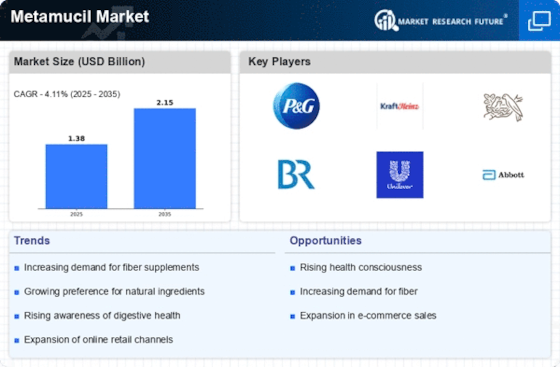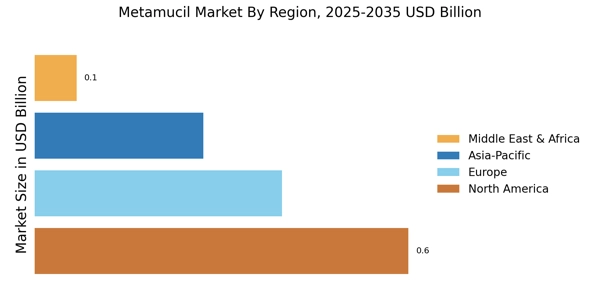Aging Population and Health Needs
The Metamucil Market is poised to benefit from the demographic shift towards an aging population. As individuals age, they often encounter various digestive health challenges, including constipation and irregular bowel movements. This demographic is increasingly turning to fiber supplements as a means to alleviate these issues. Data suggests that the population aged 65 and older is expected to double in the coming decades, which could lead to a heightened demand for products like Metamucil Market. Consequently, the Metamucil Market may see a significant uptick in sales as older adults prioritize their digestive health and seek reliable solutions to enhance their quality of life.
Expansion of Distribution Channels
The Metamucil Market is experiencing an expansion of distribution channels, which is facilitating greater accessibility for consumers. The rise of e-commerce platforms has transformed the way consumers purchase health products, allowing for convenient access to Metamucil Market and similar supplements. Additionally, traditional retail channels are also adapting to meet consumer demands by offering a wider range of products. This diversification in distribution is likely to enhance the visibility of Metamucil Market, making it easier for consumers to find and purchase these products. Market analysis suggests that the increased availability of Metamucil Market through various channels could lead to higher sales volumes, thereby positively impacting the overall growth of the Metamucil Market.
Rising Awareness of Preventive Healthcare
The Metamucil Market is benefiting from an increasing awareness of preventive healthcare among consumers. Individuals are becoming more proactive in managing their health, leading to a greater focus on dietary choices that support long-term wellness. This shift is reflected in the rising consumption of dietary supplements, including fiber products like Metamucil Market. Research indicates that consumers are more inclined to invest in products that promote digestive health as a preventive measure against potential health issues. This trend is likely to drive growth in the Metamucil Market, as more individuals recognize the value of incorporating fiber supplements into their daily routines to maintain optimal health.
Growing Preference for Natural Ingredients
The Metamucil Market is witnessing a shift towards products that emphasize natural ingredients. Consumers are becoming more discerning about the components of the supplements they consume, favoring those that are free from artificial additives and preservatives. This trend aligns with a broader movement towards clean label products, where transparency in ingredient sourcing is paramount. As a result, brands that offer Metamucil Market with natural ingredients are likely to gain a competitive edge. Market data indicates that products marketed as natural or organic are experiencing faster growth rates compared to conventional options, suggesting that the Metamucil Market could capitalize on this consumer preference for authenticity and healthfulness.
Increasing Demand for Digestive Health Products
The Metamucil Market is experiencing a notable surge in demand for digestive health products. This trend is largely driven by a growing awareness of the importance of gut health among consumers. Research indicates that a significant portion of the population is seeking natural solutions to digestive issues, which has led to an increase in the consumption of fiber supplements. In fact, the fiber supplement market is projected to reach substantial figures, with estimates suggesting a growth rate of around 8% annually. This increasing demand for digestive health products is likely to bolster the Metamucil Market, as consumers gravitate towards trusted brands that offer effective solutions for maintaining digestive wellness.


















